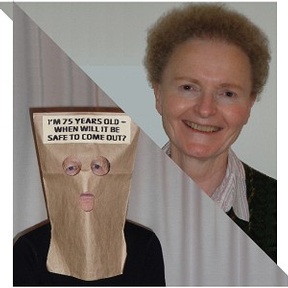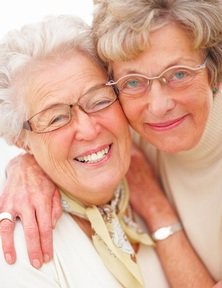Care homes need to 'make it blatantly clear it is safe to come out'
Care homes need to “make it blatantly clear” it is safe for LGBT people to be open about their sexuality, according to a campaigner who has developed LGBT awareness training for care homes.

Sue Lister and her partner Ann Murray have put together a two hour training session called Free to be Me in Care.
The training includes a performance which they showcased at the where a woman talks with a paper bag over her head to indicate she is hiding her true identity.
Ann Murray who takes on the persona of Margaret with a paper bag over her head, told care providers and care practitioners at the show: “Now I am in a care home. I fear telling staff. How many people want to spend their last years feeling vulnerable like that.
“I don’t have any pictures of my partner in my room. I am 75, when will it feel safe for me to come out.”
There are around a million LGBT people in Britain over the age of 55 and research has shown many people living in care homes feel they have to return ‘to the closet’ after being ‘out’ most of their lives due to fear of prejudice and discrimination.
'Let people be fully who they are'
Scottish Care published a report earlier this year called ‘Let’s Talk about Sex…uality and Dementia’. Chief executive, Donald Macaskill said at the launch of the report: “We have to get off our prurient moral high horses and let people be fully who they are. We have to call out discrimination especially of the LGBT community and help people live well with dementia.”
Ms Lister, spokeswoman for the York LGBT Forum and the York coordinator for Ageing Without Children, backs this stance. She told the care sector at the Dementia Care and Nursing Home Expo “older LGBT people go back into the closet once they come into your care. How can you deliver personal care if you don’t know the whole person. It is a human right to be recognised for who you are.
“There are many in our society who still have hang ups. It should be normal to say ‘this is my partner Guy or Robin’.”
She added that the care regulator, Care Quality Commission, is “now asking how many LGBT people do you have in your care? It is no longer acceptable for you to say ‘sorry I don’t ask, it is a private matter’”.
Proactive care providers
Some care providers are being proactive in this respect. Anchor has a Lesbian, Gay, Bisexual and Trans Advisory Group (LGBT+) which aims to tackle concerns that moving into sheltered housing or a care home as an older LGBT+ person may be a lonely or isolating experience.
The LGBT+ group is open to Anchor LGBT+ residents and meetings can involve advising the care provider on policies, helping to write staff guidance notes and responding to issues in the wider LGBT+ community.
In London, Ramses Underhill-Smith has set up Alternative Care Services, the UK’s first LGBTQI+ (lesbian, gay, bisexual, transsexual, transgender and queer and intersex +) domiciliary care service. He says traditional models of care in Britain are ‘letting down’ an older generation of LGBT people.
The first LGBT+ care homes are also being planned in London and Manchester.
Pockets of progression
Despite these pockets of progression, Sue Lister wants to see more care providers becoming openly LGBT friendly, saying "Do you have same sex images in your literature? Do you have an equalities person who wears a rainbow lanyard?"

She is calling on them to imagine what it is like being “an older lesbian, gay, bisexual or transgender person in need of care, feeling vulnerable and alone”.
“Silence can be oppressive as anyone who has been ‘sent to Coventry’ will know. A silence that fills the room when you enter, a silent look between others, an uncomfortable silence between you and someone you thought was your friend. Better to pretend just to be like everyone else than risk being ostracized.
“That’s why,” she says “it’s better not to rock the boat when you’re feeling old and vulnerable. That’s why you keep memories of your same sex partner hidden, never mention your previous life with them, never show photos or share stories. You never reveal your ‘criminal past’ because for you and your peers who you were and what you did was illegal until 1967. Stigmatised by society, labelled sinful by religion and shamed in your own eyes for so many years, your own silence is perfectly understandable.
“But how sad not to be able to talk about those you loved. How sad to have to spend every day in hiding in your last years. How sad that care homes routinely report “We don’t have any of them here.”
For more information about the Free to be Me in Care training session go to https://yorklgbtforum.org.uk/free-to-be-me-2/
Latest Features News
 25-Nov-19
2019 Election: Boris Johnson leaves social care in 'too difficult box' but Labour vows to end 'crisis'
25-Nov-19
2019 Election: Boris Johnson leaves social care in 'too difficult box' but Labour vows to end 'crisis'
 18-Oct-19
Podcast: Wendy Mitchell and dementia: 'My biggest fear is not knowing who my daughters are'
18-Oct-19
Podcast: Wendy Mitchell and dementia: 'My biggest fear is not knowing who my daughters are'
 27-Sep-19
Exclusive: Care minister backs care workers' call for time off to grieve and attend funerals
27-Sep-19
Exclusive: Care minister backs care workers' call for time off to grieve and attend funerals
 19-Sep-19
Podcast: Gyles Brandreth says poetry helps ward off dementia
19-Sep-19
Podcast: Gyles Brandreth says poetry helps ward off dementia
 30-Aug-19
Edinburgh Fringe funnyman joins comics facing toughest audience at care home gig
30-Aug-19
Edinburgh Fringe funnyman joins comics facing toughest audience at care home gig